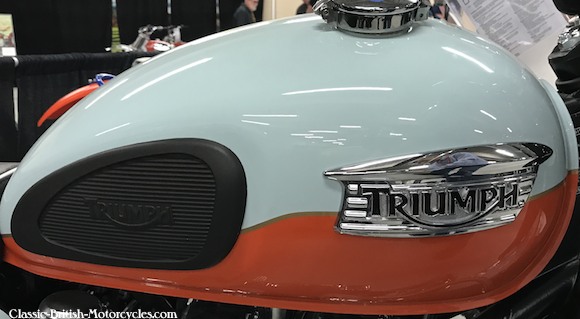2009 Triumph Bonneville
50th Anniversary

2009 TRIUMPH BONNEVILLE 50th ANNIVERSARY
The Triumph Bonneville has been with us since 1959. That classic Bonnie evolved completely in 1963 with its conversion to unit construction. These were the Golden Years for the Triumph Bonneville, with record sales, blistering performance for the day, and serious street cred. Just as the Japanese broke into the heavyweight motorcycle market with bikes like the Honda 450 Black Bomber, 750 Four, and the Kawasaki 500 triple, and Triumph was at the top of their game, they did a complete redesign on the whole bike, everything except the engine, in 1971, with the Oil-in-Frame twins. Triumph’s parent-company BSA went broke in 1972, Triumph’s workers revolted in 1974 and ended up taking over the company, forming the worker-owned Meriden Co-op. As such, they struggled along until they too went belly up in 1983. A British billionaire-developer named John Bloor bought what was left of the company for a song, then licensed the rights to produce the classic Bonneville to Les Harris who hand-built Les Harris Bonnevilles in low numbers until 1989 or so. In the meantime, Bloor had been building Triumph into an entirely new and totally modern motorcycle company. By 1990 they were open for business in their sparkling new high-tech factory in Hinkley, England turning out Triumph triples and fours. Their success has been the stuff of legends, but all through the 1990s, they focused just on modern sport and touring bikes. But in 2001, Triumph launched a new, retro-styled 800cc Triumph Bonneville twin to great acclaim and market success. 2009 marked the half-century mark for this iconic and extremely important motorcycle, and was commemorated with the 2009 Triumph Bonneville 50th Anniversary.
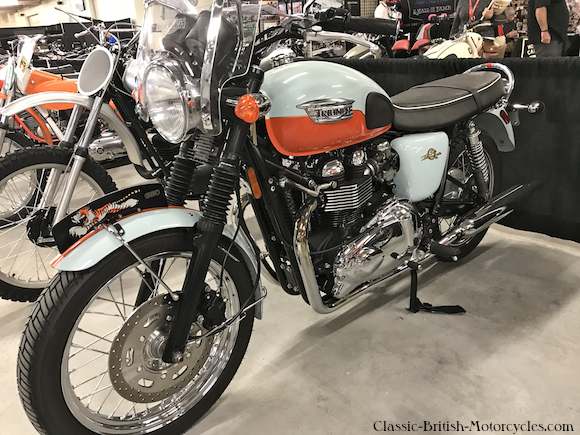
PAINT SCHEME HARKENS BACK TO THE BEGINNING
The 2009 Triumph Bonneville 50th Anniversary is painted in an orange-and-creme two-tone paint scheme that apes that of the original 1959 Bonneville (seen below). The Bonneville was Triumph’s first twin-carb bike and as such was at the top of the food chain in Triumph’s performance hierarchy. Yet when it came time to style their hot rod bike, instead of giving it the lean, mean look of the TR6, which was incredibly popular in the US, Triumph opted to style the new bike along the lines of its more pedestrian Thunderbird. The Bonneville came with big fenders, a big clunky tank, and a stodgy-looking headlight nacelle. And it came in this rather odd 2-tone color combo of orange-and-creme. While the bike was a hit due to it’s performance, and the marketing cache of 2 carbs, the styling turned a lot of buyers off. Many had their Triumph dealers swap out the bodywork for TR6 parts before picking up their new Bonnevilles. It didn’t take Triumph long to catch on. By 1960, and from then on, the Bonneville was styled just like the TR6, just with different color schemes each year.
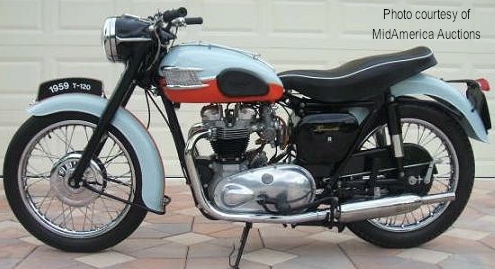
ABOVE: 1959 Triumph Bonneville.
BELOW: 2009 Triumph Bonneville 50th Anniversary
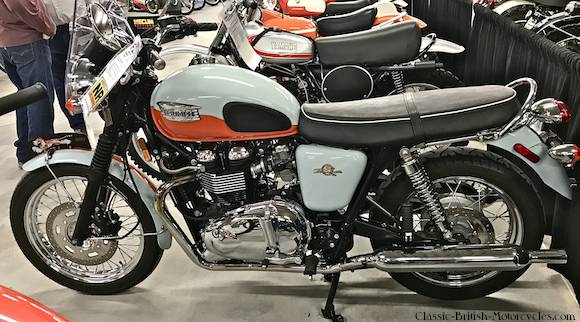
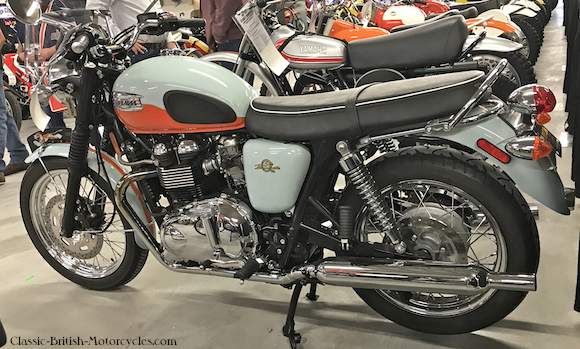
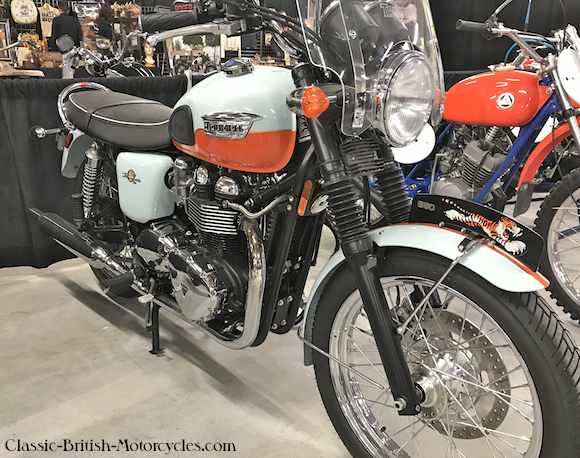
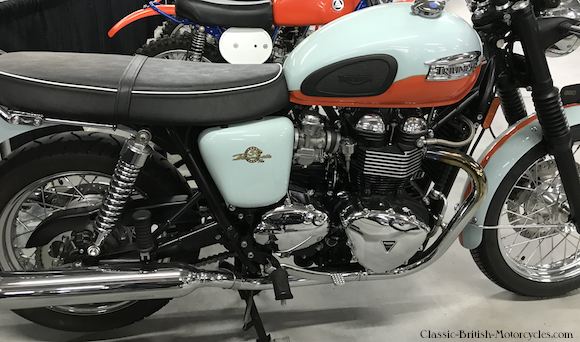
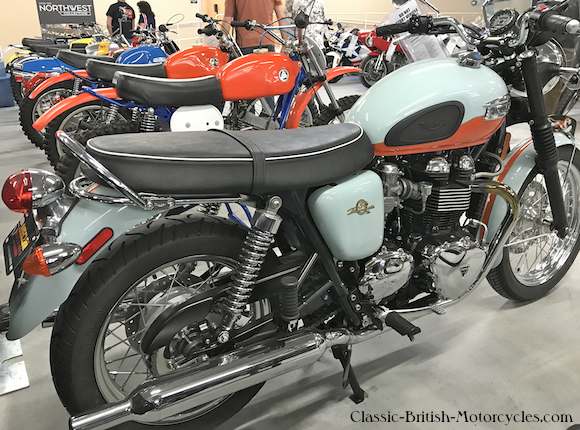
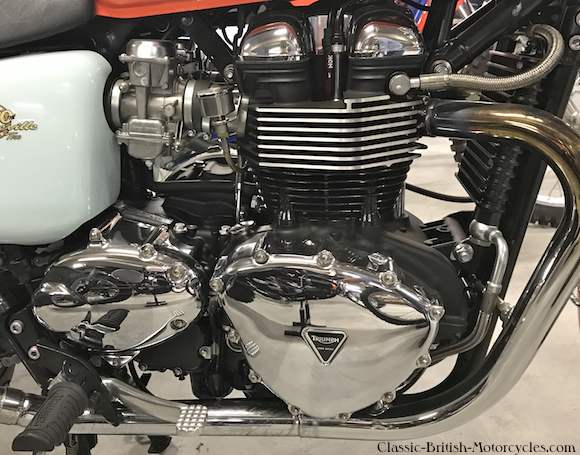

2009 Triumph Bonneville 50th Anniversary
SPECIFICATIONS
|
Price when new: Engine type: Displacement: Bore & Stroke: Compression ratio: Fuel system: Ignition system: Power output: Torque output: Lubrication system: Charging system: Battery Gearbox: Final drive: Wheelbase: Seat height: Fuel capacity: Fuel economy: Suspension, front: Suspension, rear: Tire, front: Tire, rear: Brake, front: Brake, rear: Rake: Trail: Weight: |
$7,699 USD Air cooled DOHC 8-valve twin 865cc 90mm X 68mm 9.2:1 Multiport sequential EFI Electronic 58.6 hp @ 7400 rpm net 44.7 lb-ft @ 6500 rpm net Wet sump, 4.75 qt capacity 12-volt alternator, 312 watts 12-volt, 12 amp-hours (12V 12AH) 5-speed, left-foot shift X-ring Chain 57.2″ / 1453mm 29.5″ / 749mm 4.2 US gal / 16.7L 47 mpg, observed 41mm Kayaba forks w/4.7″ travel Swing arm w/2 Kayaba shocks w/3.9″ travel 110/70 R17 130/80 R17 1X 310mm disc, Nissin2-piston caliper 1X 255mm disc w/Nissin 2-piston caliper 27 degrees 4.2″ 500 lbs / 227 kg |


